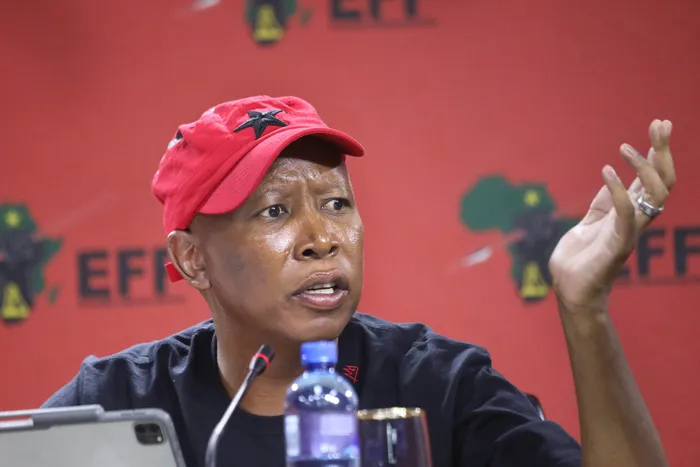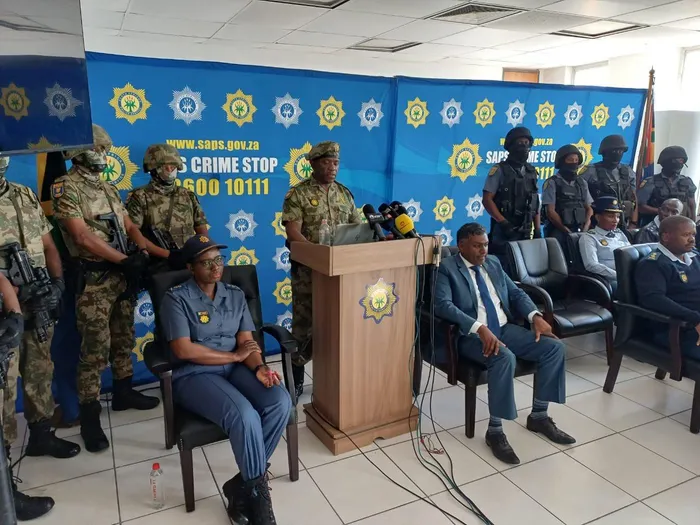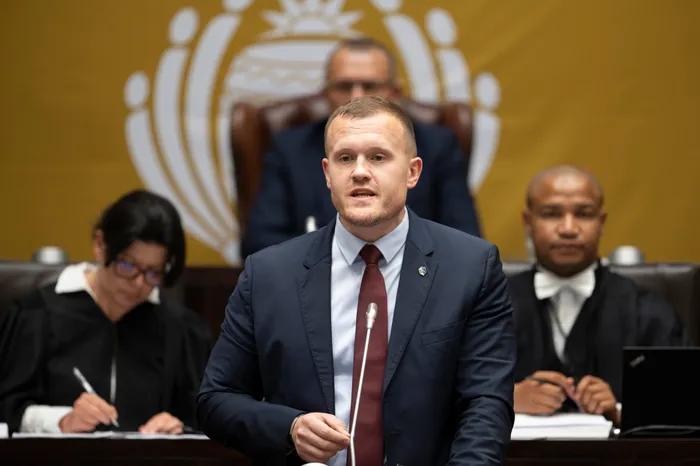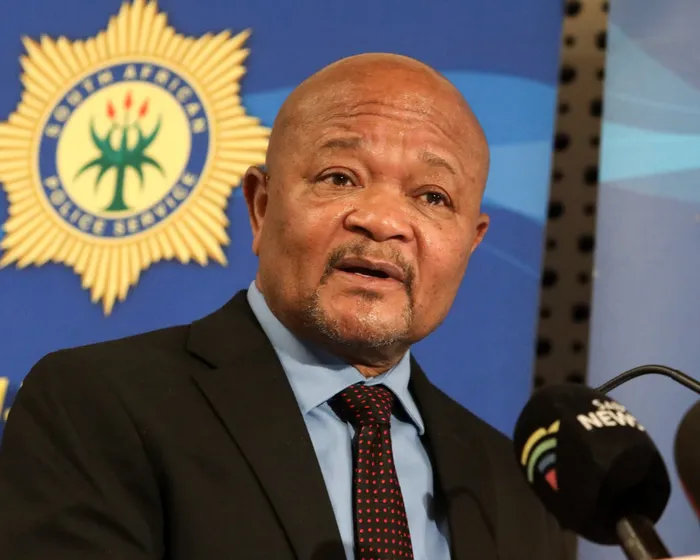Economic Freedom Fighters: SAPS is the chief crime syndicate operating in South Africa

The Economic Freedom Fighters, led by Julius Malema, has thrown its weight behind KwaZulu Natal police commissioner, Lieutenant General Nhlanhla Mkhwanazi, arguing that the SAPS has become ineffective in the face of rampant crime.
Image: IOL
The Economic Freedom Fighters, led by Julius Malema, has come out in support of KwaZulu-Natal provincial police commissioner, Lieutenant General Nhlanhla Mkhwanazi, after he made damning allegations against Police Minister Senzo Mchunu, deputy national police commissioner, Lieutenant General Shadrack Sibiya and other high-ranking officers.
IOL reported on Sunday that Mkhwanazi questioned Mchunu’s decision to disband the political killings task team without informing the national police commissioner, General Fannie Masemola, and himself as the provincial police commissioner in KwaZulu-Natal.
The task team, established in 2018, was a multidisciplinary unit focusing on politically motivated killings and related crimes in KwaZulu-Natal.
Mkhwanazi accused Sibiya of being a "criminal" and of improper conduct, allegedly at the behest of Mchunu, for summarily closing the political task team.
Mkhwanazi said the unit was disbanded just as it was circling on a criminal syndicate which included top police, prosecutors and Members of Parliament. The dockets under investigation were said to be archived by Sibiya in Pretoria.

KwaZulu Natal police commissioner Lieutenant General Nhlanhla Mkhwanazi addressing the media briefing.
Image: SAPS
Speaking to broadcaster Newzroom Afrika on Sunday night, EFF spokesperson Leigh-Ann Mathys said the South African Police Service has become the home of criminals.
"The South African Police Service is the chief crime syndicate operating in this country. All other crime syndicates answer to it. We raised this during the budget debate in Parliament on Friday. If South Africans even know the rot that is happening in the South African Police Service, nobody would even bother to try and get justice there," said Mathys.
"We would just end up as a country that operates on mob justice. There is nothing. The only way we are going to clean up that SAPS is that all those high-ranking police officials must be fired, they must reapply for their jobs, and they must be vetted independently. Even the vetting process is not even proper in the South African Police Service as it stands."
She said the reactions by Mchunu and Sibiya show that there is no urgency to address the nation on the widespread allegations levelled against them. She said claims that Mkhwanazi has brought the SAPS into disrepute do not hold water, as the police are already in disrepute.
"No one even wants to go and open cases at the police stations because we know you have to pay somebody or the case just ends up being a cold case, or you end up being abused. Who trusts the South African Police Service as it stands now? If we go and open a case, we go there just to get a reference number so that we can go and claim on insurance, otherwise, if someone broke into your house and you do not have insurance, you won't even bother going to report it. That is how bad it is," she added.
The EFF said South Africans are not protected, and live at the mercy of marauding criminals.
"We do not have protection in this country at the moment. How is it that the minister does not know that the KZN commissioner has gathered evidence, or how does Sibiya not know that there is a KZN commissioner who has gathered evidence against him and is going to present that? What is that telling us about the state of the South African Police Service? she asked.
The EFF said "the very few good officials left in SAPS" have no option but to speak out, as Mkhwanazi did on Sunday.
Earlier, IOL reported that deputy national police commissioner for crime detection, Sibiya, has strongly denied the explosive allegations made by Mkhwanazi.
Speaking to the SABC News shortly after Mkhwanazi's explosive revelations, Sibiya accused Mkhwanazi of making baseless public accusations, adding that he must "stop behaving like a criminal and behave like a disciplined member of the police".
"He must stop behaving like a criminal and behave like a disciplined member of the police. Tell him to stop threatening people and talking about violence there. He must stop behaving like a warlord. He's a member of the police." Sibiya told the public broadcaster.
Police Minister Senzo Mchunu has also denied allegations of political interference in the work of the SAPS.
On the other hand, chairperson of Parliament’s Portfolio Committee on Police, Ian Cameron, has expressed concern following the explosive allegations made by Mkhwanazi.
Cameron said the allegations are serious and require urgent attention from the head of state, President Cyril Ramaphosa.
“The allegations, if correct, have far-reaching implications on the effectiveness of the South African Police Service and require immediate attention. The committee has long highlighted concerns over the rot within the SAPS which impacts its ability to investigate acts of crime and bring the worrying crime statistics down,” said Cameron.
He highlighted that the allegations are noteworthy because they have been made by such a senior-ranking officer within the SAPS.

Chairperson of the Portfolio Committee on Police, Ian Cameron.
Image: Armand Hough/Independent Newspapers
In January, Cameron highlighted concerns over the lack of detail in the directive to close the Political Killings Task Team and the moratorium on the filling of vacancies within the Crime Intelligence (CI) environment, especially in the context of the centrality of CI in proactive crime prevention.
Cameron said the allegations by Mkhwanazi are also worrying because they lay bare the strained working relationship among senior officers within the SAPS.
“If those saddled with the responsibility to drive strategies to combat crime are not working in tandem, then the entire organisation will not achieve shared goals. The President needs to lead by outlining a process to investigate the allegations and restore the credibility of the SAPS,” Cameron emphasised.
He said the parliamentary committee will meet to decide on the best process to look into the allegations and ensure accountability.
Among the interventions, Cameron said the interventions might include calling an urgent meeting with all relevant stakeholders to account for the allegations.
“What is clear is that Lieutenant General Mkhwanazi has taken great personal risk to make these allegations, and the committee, Parliament, and the people in general must demand answers,” said Cameron.
Mkhwanazi said he would open a case against Mchunu for alleged interference in policing matters. He said this extended to the minister’s hand and influence in the closure of the task team unit investigating political killings.
He also said links between an associate of the minister and the alleged criminal underworld, had been made through cellphone analysis.

Minister of Police Senzo Mchunu
Image: Jacques Naude / Independent Newspapers
Mkhwanazi also appeared to be defending his boss, national police commissioner, General Fannie Masemola and the senior officers recently arrested in terms of a recent Crime Intelligence racket bust. He proclaimed his boss was the police commissioner, no one else, and that the police minister had no rights nor powers to close down policing units. He also claimed there was a ploy to remove Masemola in order to destabilise the police.
Mkhwanazi made damning and alarming revelations, accusing Mchunu of interference in policing operations and of shutting down the political killings task team unit just as it was uncovering links between a powerful drug cartel and high-ranking politicians, police officers, and prosecutors.
Get your news on the go, click here to join the IOL News WhatsApp channel.
IOL News